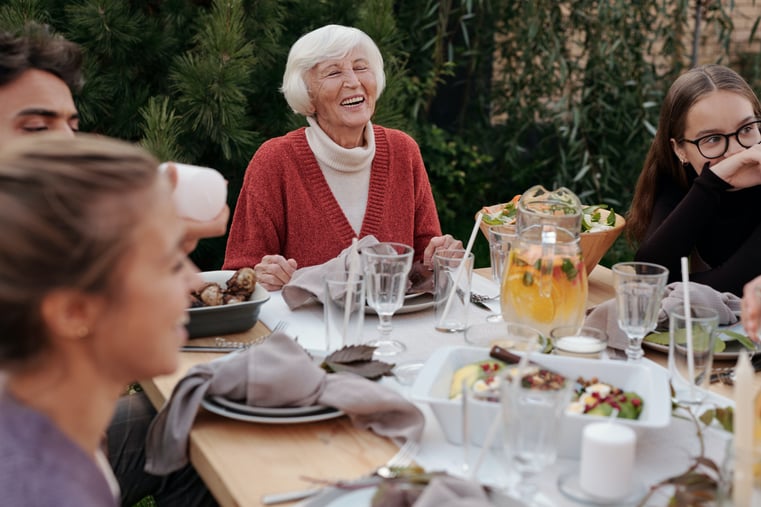
The Holiday Season is upon us, and many of us are filled with a mix of emotions. While we might be excited to see family we haven't seen in a while, we may also feel some anxiety. The fact is we still want to enjoy a safe, fun, and memorable holiday season. Right?
The Holidays can get busy with lots of activities and events to attend, some are full of joy, and some may bring out the worst in people - those people we may call family. So, why are the Holidays so challenging for some people? And, what can we do about it?
As Therapists, we often take a family history to identify patterns/processes (dynamics), where they developed, and how they may repeat themselves in the family tree. We know behavioral patterns can become programmed when we are babies, and traits can be unconsciously carried on for decades, if not a lifetime. Others get handed down from generation to generation, just like the silver set. On paper, there is a generational replay of things like addiction, affairs, or strife between siblings - the same among aunts, uncles, or grandparents.
Further, as children, we rarely have any perspective about what is going on in the family. It's important to note that most children don't understand when something is healthy or unhealthy. Kids simply know that's how it is in the family and manage the best they can. All the while, that dynamic is imprinted in their brains, and when they become adults, the pattern is repeated. That pattern is often unconsciously reenacted.
So, here we are twenty years later, gathering for the Holidays. No matter our life accomplishments or professional growth, it seems we can fall right back into those familiar patterns without even realizing it. Whether it's sibling rivalry, politics, or good old family dysfunction, we arrive at the Holiday dinner with a casserole and a little armor in anticipation of the drama.
Sure, we may try to avoid last year's debacle, yet the conversation inevitably takes a southward turn. Everyone reaches for an old familiar role, and off we go again into yet another painful family holiday.
So, let’s change the old unhealthy family holiday drama and create a new healthy dynamic that works better for you.
8 Tips To Lessen Holiday Stress And Create Healthy Family Holidays

#1 - Pat Yourself On the Back For Seeking Holiday Stress Strategies.
You are choosing to read this blog right now. That fact alone indicates you're already being proactive and preparing.
You may also start to realize you cannot change others, but you can change your part of the pattern. Having that simple awareness gives you another notch on the growth chart and an edge in staying conscious and proactive in any situation - especially family dynamics.
#2 - Expect the Best From Your Holidays. Be Prepared If It Goes Sideways!
If you expect the best, you will be more positive, and relaxed energy can mitigate your tension.
If something does happen that strikes a negative chord, take a deep breath and remember the following:
-
"Because I feel triggered at this moment doesn't mean I need to react."
-
"I have the choice to respond rather than react at this moment."
We'll get into responding vs. reacting more in a moment. For now, you might consider making a note and keeping it in your pocket on the big day or sending it to yourself in a text message.
#3 - Get Organized and Plan Ahead.
Keep your strategies in mind on the day of the holiday event. Keep a reminder that states the simple fact:
-
"No one controls me."
-
“I can't control others."
Just because the pattern is familiar (notice the root of that word) doesn't mean you have to re-trace it every holiday. Here's what you can do instead:
-
Enjoy some nature and go outside and take a little walk.
-
Help out in the kitchen and assist in cooking or preparing the food.
-
Focus on conversations with a relative you choose and enjoy.
-
Go outside and FaceTime a good friend.
-
Listen to a quick podcast or use the "Calm" app with earphones in the bathroom.
#4 - Avoid Negativity Around You - Speaking it and Hearing it.
If you notice someone is starting to go down the path of negativity and start saying negative comments, it's tempting to react.
It's so essential in this situation to remember your choices - you can choose how you engage. Are you choosing to react or respond?
Responding is a much healthier choice for you. It does take a little discipline to override the negativity (which is an addiction, BTW). The effort and outcome of growth are well worth the effort. A response will get you more of what you want, e.g., to operate within your value system rather than getting hijacked into reactivity.

#5 - Learn How Your Brain Works and Manage Triggers.
You have a brainstem, and it does a great job of keeping you alive in the world. However, it's not always reliable at distinguishing between real and perceived danger. Your snarky sibling is (hopefully) not actually dangerous. Therefore, you don't need that cortisol-induced fight or flight reaction.
If you find yourself getting triggered, do the following:
-
Take a full, deep breath. Literally, then exhale. (This activates your parasympathetic nervous system so you can stay cool).
-
Make a choice to take a quick break before you react.
-
Stop and make a cup of tea, or drink a full glass of water.
-
Go outside and look for five unique things you’ve never noticed before
-
Slow your mind down and continue to slow your breathing.
-
Rise above and imagine yourself 30K feet above and looking at the dysfunctional pattern very clearly to choose your healthy response
-
Give yourself a mental pat on the back and congratulate yourself on taking a positive step for your health.
#6 - Strategies if Conflict Happens Around You.
If and when conflict occurs near you, it's important to remind yourself that you are not in charge of what's happening.
You are not in charge of fixing the family dynamic. You are only in charge of how you respond vs. react.
#7 - Remind Yourself About The Reality of Conflict.
-
Conflict is neither good nor bad. It just means you see things differently.
-
Conflict is an opportunity to learn about another person's perspective.
-
Conflict is a chance to become curious and discover how others view the world.
-
Managing conflict in a healthy way starts with practicing curiosity.
-
Conflict grows when you view it through the lens of judgment.
#8 - Practice Daily Tender Loving Care For Yourself.
Focus on and practice excellent self-care. This is one of the most effective ways to stay mindful through these "opportunities for growth."
Types of Holiday Time Self-Care:
-
Get outside every day in nature.
-
Balance negative feelings by listening to inspiring audiobooks.
-
Listen to happy holiday music.
-
Get a kind of massage you’ve never had before.
-
Fill your home with smells of the holidays - cinnamon, pine, and more.
-
Build your imagination and paint a holiday dream picture.
-
Cook a healthy and cozy “hygge” meal to share with someone you love.
We hope these tips help during this Holiday season! Staying fully present and showing up to be curious and compassionate will help you have a little more joy, shift your perspective and maybe make some new and special holiday memories too!
If you're struggling with healthy communication with your partner or family, we're here to help with our Imago Relationships Workshops and Imago Relationships Therapy. You can also attend our Imago Insights Webinar: Family, Politics, and Holidays.
Discover more about Imago with our Imago Professional Membership, Imago Professional Facilitators, and Imago Professional Training.
%20/images/Jeannie%20Ingram,%20LPC-MHSP%20-%20Imago%20Relationships%20North%20America.jpg?width=160&name=Jeannie%20Ingram,%20LPC-MHSP%20-%20Imago%20Relationships%20North%20America.jpg)
This blog post was written by Jeannie Ingram, LPC - MHSP, Certified Imago Relationship Therapist
Jeannie Ingram is a Licensed Professional Counselor, Coach, and Consultant. In her role as psychotherapist, she specializes in couples therapy as a Certified Imago Relationship Therapist and Getting the Love You Want Workshop Presenter. In workshops and in therapy, she helps couples move beyond destructive, painful arguing to improve communication, restore their connection, live and love in more positive, fulfilling, satisfying relationships.
Jeannie assists individuals who need help improving ineffective patterns or managing life transitions to find positive change or growth.
She has a Bachelors Degree in Psychology and a Masters in Counseling from the University of Alabama at Birmingham, as well as a Post-Baccalaureate Certificate in Marriage and Family Therapy from Capella University. Jeannie helps couples reconnect in her private practice in Nashville, TN, and through her Getting the Love You Want and Start Right, Stay Connected Couples workshops in the Southeast.
She loves cooking, writing, hiking, kayaking, and sailing. Most of all, she is dedicated to helping couples and individuals find joy, meaning, success and connection through the practice of mindful, purposeful living and loving.
Check out Jeannie's website too!


